Lowell Week in Review: January 14, 2018
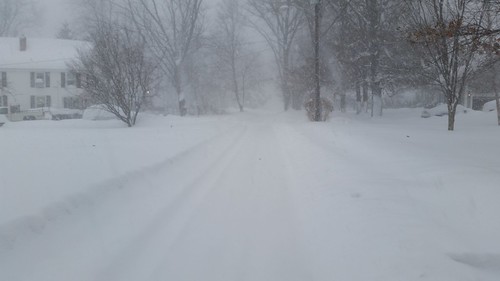
Climate Resiliency
I really enjoyed the 50 degree temperatures we had on Friday, even with the rain. Two weeks of sub-freezing and often sub-zero weather was tough to take. I didn’t mind the 12 inches of snow we picked up a week ago Thursday, but the image from that storm that has stuck with me was video of flooding on Boston’s Atlantic Avenue, right in front of the New England Aquarium. The flooding wasn’t from a burst pipe, it was from the Atlantic Ocean which over flowed the area in a way not seen before, including during the Blizzard of 1978.
In the aftermath of that flooding, Boston Mayor Marty Walsh and others talked about the need for greater climate resiliency. To be climate resilient means having the ability to absorb the extremes of weather that accompany climate change. It’s about making systems and cities more sustainable.
Sustainable. Where have I heard that word before? Oh yes, Sustainable Lowell 2025, the city’s comprehensive master plan that was unanimously endorsed by the city council in 2013 but which no local elected official has referred to since.
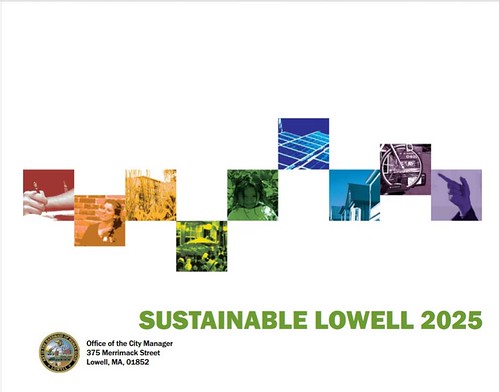
The plan begins by citing 15 sustainability accomplishments by the city in the decade that preceded the plan, ranging from the renewable energy enhancement of 47 city buildings to a 33% reduction in solid waste tonnage through the use of recycling bins.
Future objectives cited by the plan are very neighborhood-focused including reviving neighborhood business districts, integrating parks and greenspace into the urban fabric, and prioritizing land use policies that promote walkable neighborhoods.
The plan has an entire chapter on Environmental Resilience. Here’s the introductory paragraph:
Lowell will strive to bolster its growing reputation as a model for environmentally sustainable practices in an urban setting. It will accomplish this goal by proactively preparing for and adapting to climate change and continuing efforts to reduce its emissions of greenhouse gases so as to mitigate its impact on the environment.
Here are the ten objectives identified in the Environmental Resilience chapter:
- The City of Lowell will set an example by prioritizing environmentally sustainable policies and practices.
- Develop policies and programs that will build upon the successes of reducing solid waste and increasing recycling citywide.
- Develop programs and policies to reduce the disposal of organic wastes into the waste stream.
- Improve water quality.
- Improve air quality and reduce carbon emissions through energy efficiency enhancements and the adoption of alternative fuels.
- Promote urban forestry as a method of improving public health as well as the physical and built environment.
- Produce energy from renewable sources.
- Seek to reduce the adverse impacts and severity of flood events.
- Prepare proactively for heat waves, droughts, ice storms, and other types of natural disasters so as to mitigate their negative impacts.
- Educate the public about the importance and urgency of climate change and carbon emission reduction.
All seem reasonable and achievable. Some, like producing energy from renewable sources, have seen some progress. But many have been ignored, like the plan in its entirety.
The military is obsessive about planning, but all commanders understand that even the best plan only survives the start of the engagement. Still, those same commanders also understand that it is better to modify an existing plan than it is to make things up as you go along. If councilors believe circumstances have changed since Sustainable Lowell 2025 was unanimously adopted, they should take steps to modify the plan. They should not ignore it.
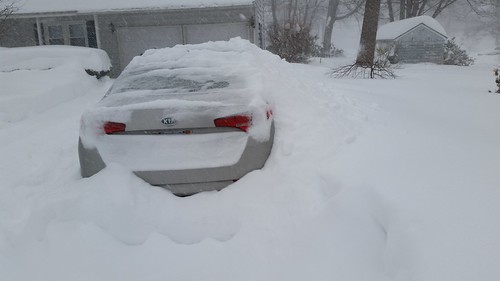
Getting back to weather extremes, I suppose anytime we experience a stretch of deep cold or an extended heat wave or a powerful storm, there’s a tendency to label it the worst there’s ever been, so we have to guard against exaggerating the scale of recent weather events. Notwithstanding that caveat, it does seem that our weather has grown more extreme in recent years. Consider our recent two week long, record-breaking cold spell, or the 115 inches of snow that fell on Lowell two winters ago, or the flooding of the Merrimack in 2006 and 2007. And how many times have we lost power? Many more in the past decade than I can recall in the decades that came before. Power outages happen so often that a generator is now seen as standard equipment in many homes.
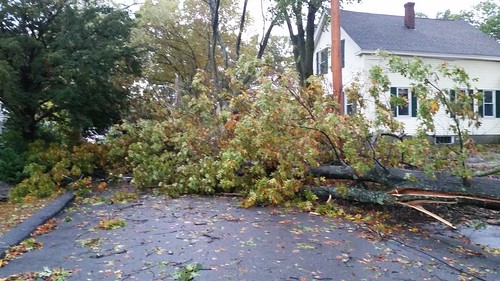
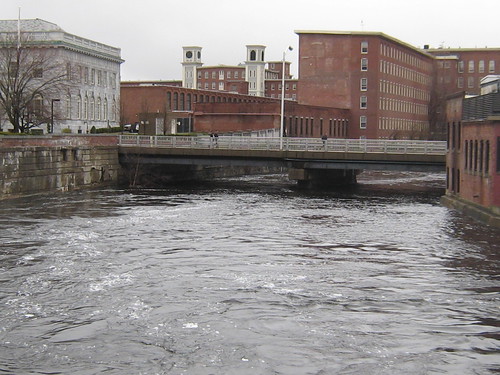
Flooding on the Concord River at East Merrimack St
The United States remains one of the few developed countries in which a significant portion of the public does not accept the scientific consensus that dramatic climate change is occurring and that it is the result of human activity. That’s partly a result of the American mainstream media’s preference for entertainment over accuracy. It’s also because many among us take pride in disparaging learning and expertise. Why should I believe a person with a doctorate in science who says the earth is warming when recent weather has been colder than ever before?
One of my favorite Twitter accounts is Capital Weather Gang, which is the Washington Post’s weather team. Besides DC-area forecasts, Capital Weather Gang also provides worldwide weather news. At the start of that two-week long cold spell (on December 27, 2017 at 4:31 PM, to be precise) here is what they tweeted:
U.S. to be coldest region in world relative to normal over next week. Please note rest of world will be much warmer than normal lest anyone try to claim pocket of cold in U.S. debunks global warming, which they will invariably and irresponsibly do.
Joking about or consciously disputing climate change is irresponsible. It’s past time for us all to take this seriously.
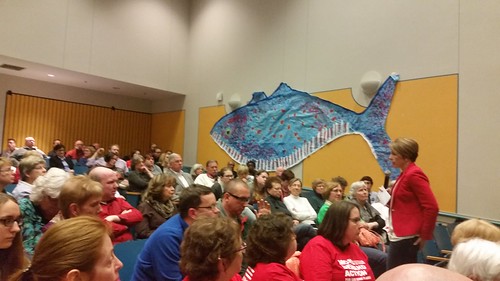
Attorney General Maura Healey at public meeting at Lowell’s Wang Middle School, May 2017
Attorney General Maura Healey assisting Lowell
Ten years ago when Lowell was being wracked by the foreclosure crisis, then Attorney General Martha Coakley created a division in her office called Home Corps, the mission of which was to help individuals who were facing foreclosure. Home Corps established offices around the state including one in Lowell and did much to help individual home owners who were in financial distress. Communities in which those homes were located, like Lowell, greatly benefited from the program.
Foreclosed and abandoned properties can quickly drag down an entire neighborhood, so the efforts of Coakley’s office to prevent foreclosures from occurring proved very beneficial to Lowell. In my capacity as Register of Deeds for the Middlesex North District (which includes Lowell), I worked closely with the Attorney General’s office and with city officials back then, helping to trace the deeds, mortgages and foreclosures that affected those properties. That was when I first met Maura Healey, who was the Deputy Attorney General who oversaw the effort from the AG’s office. From the start, I was very impressed by Healey and so four years ago when she entered the race to succeed Coakley as Attorney General, I readily supported her.
Now as Attorney General, Maura Healey is again assisting Lowell with the issue of abandoned properties. One day last summer, I received a call from her office. Rather than have its Abandoned Housing Initiative team of lawyers and paralegals crisscross the state to handle a problem property or two in many different communities, the AG’s office wanted to try something different – to mass all of their resources in one neighborhood of one community to see if a big infusion of resources could make a difference. They asked if I thought the city of Lowell would be receptive to entering a partnership on this effort. A quick phone call to City Manager Kevin Murphy yielded an enthusiastic “yes” from the city. The AG’s assistance would indeed be welcome and appreciated and so the partnership was formed.
Examining the data related to foreclosures and abandoned properties, it was decided that Centralville should be the focus. Since then, the Attorney General’s personnel have done the necessary research and title examinations on abandoned properties in Centralville that were identified by the city’s Development Services team.
Now, the AG’s team will commence the receivership actions against these properties. In this context, receivership is a judicial process whereby the Attorney General will petition the appropriate court to appoint a receiver who will enter onto the property and bring it up to code. The receiver then has a lien on the property for the value of the work done. This lien is superior to all others, except for municipal liens, so it would have priority over any mortgages or executions that encumber the property. Once the property is brought up to code, the record owner has the opportunity to reimburse the receiver for the full value of all repairs. If the owner is unwilling or unable to do so, the receiver may then foreclose the lien and sell the property, all while under the continuous supervision of the court.
While a municipality may initiated a receivership, it is a long, resource-intensive process that the already very busy city solicitor’s office may not have time or resources to undertake. Consequently, having lawyers and paralegals from the Attorney General’s office handle the court proceedings and related research is of great benefit to the city of Lowell. The team from the Attorney General’s office is scheduled to make a presentation on this program to the Lowell City Council this Tuesday night, so check back afterwards for a report on what was said.
Upcoming Events
Despite it being winter, there is much going on in Lowell. Here is a sampling of upcoming events:

Winterfest 2018
Lowell’s annual Winterfest will take place on the evening of Friday, February 23 and throughout Saturday, February 24. Along with activities for the kids, live music, and a craft beer showcase, there will be the traditional soup bowl competition and the chocolate festival at St. Anne’s. Winterfest takes place on Lucy Larcom Park and nearby Arcand Drive.
Democratic Campaign Institute
Next weekend Democratic officials, candidates, operatives and activists from across the Commonwealth will descend on the UMass Lowell Inn & Conference Center for a two day campaign institute. Along with plenty of general sessions, there will be three specific tracks, one for candidates, another for campaign operatives and a third for activists. The fee for the Institute is $75 which includes a welcome reception on Friday night plus breakfast and lunch on both Saturday and Sunday.
Lowell Women’s Week
In its 22nd year, Lowell Women’s Week will be held from February 25 through March 10, 2018 and will feature many events that recognize the achievements, struggles and contributions of women in our community. Check out Women’s Week website for more information.
Citizen Jane: Battle for the City
On Tuesday, February 27, 2018 at 6:30 pm at Lowell National Park Visitor Center at 246 Market Street, the Lowell Parks and Conservation Trust in partnership with the Lowell Film Collaborative, will show the film Citizen Jane, a documentary about the activist and writer Jane Jacobs, who fought to preserve urban communities. After the film, I will lead a discussion about the film and its application to Lowell.
On the Road Marathon
On Saturday, March 10, 2018, the Pollard Memorial Library will host a marathon reading of Jack Kerouac’s On The Road. This event will feature a relay of volunteers reading aloud On The Road from cover to cover. Modeled on New Bedford’s famous Moby-Dick Marathon, which was held for the 22nd consecutive year last weekend, the Lowell city library event will join the roster of Keroaucian activities the celebrate the great writer’s March birthday. To sign up as a volunteer reader and for more information about the On The Road Marathon, visit the library’s webpage.
Also as part of Kerouac’s Birthday celebration, on Sunday, March 11, 2018 from 10 am to 10 pm at the Ayer Lofts Art Gallery, 172 Middle Street, Aloysius Productions will present an exhibit called Collage of a City featuring portraits of Lowell people who participated in the Merrimack Lowell Community Film Project.
Irish Cultural Week
Also in March is Irish Cultural Week. This year’s schedule is still being developed but check back for updates in the coming weeks.
thanks Dick, very informative, as usual.